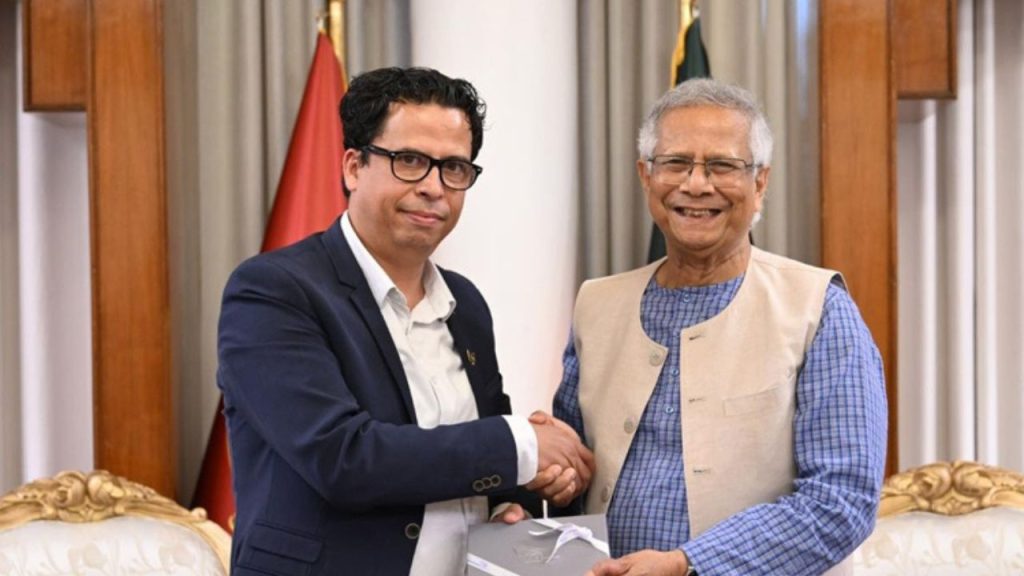Chair of the European Parliament’s Subcommittee on Human Rights, Mounir Satouri, has emphasised the necessity for Bangladesh’s upcoming national elections to be conducted in a “fair and transparent” manner, with all parties respecting the results.
He stressed that political stability is essential for fostering economic development and improving living conditions in the country.
“The upcoming elections must take place in a fair and transparent manner, and their results should be respected by all,” Satouri told UNB in an interview. He stated that such elections are crucial for ensuring stability in the aftermath of the electoral process.
While concluding his Bangladesh visit on Thursday, Satouri underlined that elections are only one step in the broader process. It is important for all political stakeholders to back reforms that have garnered consensus and support their implementation.
The European Parliament delegation, which included Isabel Wiseler-Lima (EPP, Luxembourg), Arkadiusz Mularczyk (ECR, Poland), Urmas Paet (Renew Europe, Estonia), and Catarina Vieira (Greens/EFA, Netherlands), visited Bangladesh to gain insight into the interim government’s work on promoting good governance, advancing human rights, and upholding international labor standards, as well as to discuss the EU-Bangladesh partnership.
Satouri reflected on Bangladesh’s history, noting that there were past concerns about the separation of powers, judicial independence, and the lack of civil and media freedoms—key elements of a healthy democracy.
He expressed hope that in the post-election period, the parliament will prioritise the separation of powers to ensure a stable governance structure.
As part of the Subcommittee for Human Rights’ regular missions, Satouri shared that the delegation chose Bangladesh for two key reasons: the country is undergoing a democratic transition.
He added that the EU is poised to strengthen its partnership with Bangladesh in the coming months.
Satouri elaborated that whenever the EU seeks to deepen its ties with a third country, the Subcommittee for Human Rights conducts a visit to assess human rights conditions and highlight the importance of upholding rights, the rule of law, and fundamental freedoms as essential elements in any EU agreement.
The European Union has long supported Bangladesh’s democratic transition, and Satouri noted that the interim government has made significant strides, with reforms having a tangible impact on the country’s future.
However, he emphasised that the transition is not yet complete, and the elections remain a critical step.
The delegation met with several key figures, including Chief Adviser Prof Muhammad Yunus, Foreign Adviser Md Touhid Hossain, civil society organizations, labor representatives, and multilateral organizations. They also held discussions with Prof. Ali Riaz, Vice Chair of the National Consensus Commission.
Satouri recognized the interim government’s reform process, which began after the 2024 political upheaval, and included changes to the electoral system, the judiciary, and other key institutions. He said that if these reforms receive broad support from political parties, it will ensure a smooth transition under the best conditions.
The European Union and Bangladesh have resumed negotiations on a new Partnership and Cooperation Agreement (PCA). The PCA, currently under the EU’s Everything but Arms (EBA) enhanced engagement process, addresses concerns related to human rights and labor rights.
Satouri explained that the PCA will serve as a crucial framework for EU-Bangladesh relations, beyond trade issues, and will aim to balance the interests of both sides.
He emphasised that the human rights aspect is central to this agreement, which will be assessed by the European Parliament once negotiations are completed.
“We, the Subcommittee for Human Rights, will scrutinize the quality of the human rights commitments in the agreement,” he said, adding that the agreement will bind both parties beyond the current government’s tenure.
He stressed the importance of ensuring that the agreement reflects the concerns and interests of the population while fostering prosperity and human rights.


